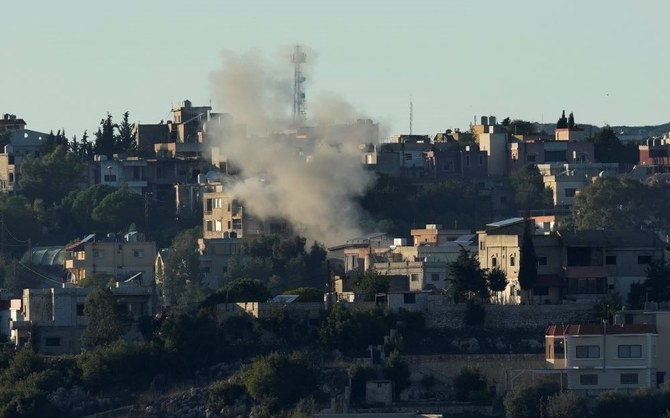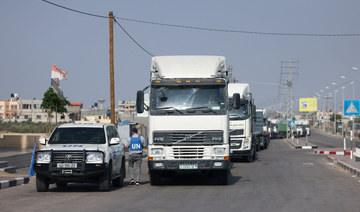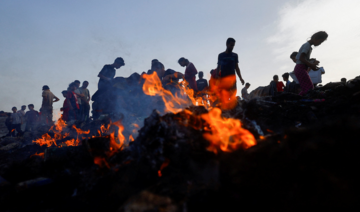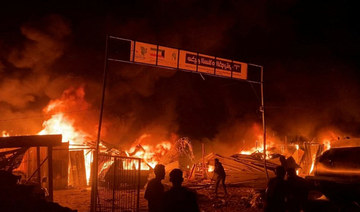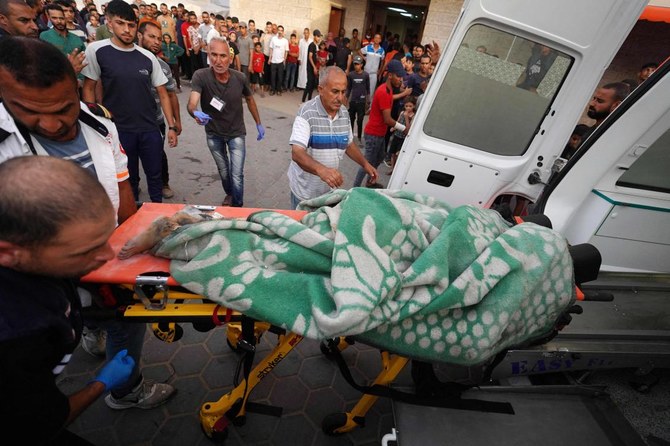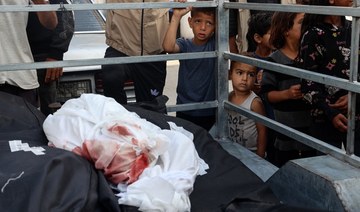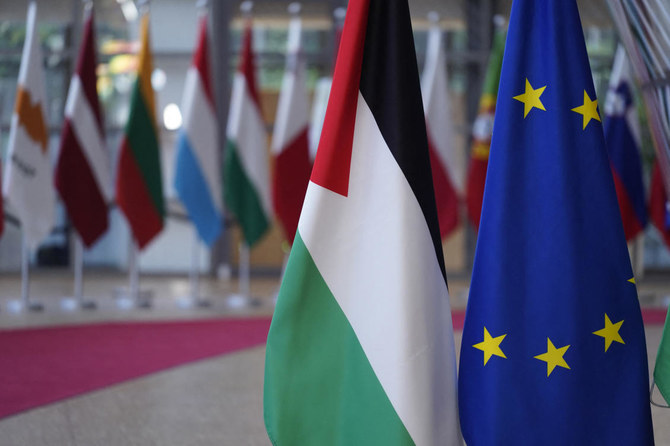BEIRUT: Eight people were killed on Tuesday in southern Lebanon due to Israeli artillery shelling and drone attacks, among the victims a journalist and photojournalist.
Farah Omar, a correspondent for Al-Mayadeen TV, and photojournalist Rabie Al-Maamari, were killed in an Israeli airstrike in the Tayr Harfa triangle. Civilian Hussein Aqeel, who happened to be with them, also lost his life.
Al-Mayadeen expressed deep sorrow for the loss of “the martyrs Farah Omar and Rabie Al-Maamari, who died as a result of treacherous Israeli targeting.”
Ghassan bin Jiddo, Al-Mayadeen director, said the journalists were deliberately targeted: “It was a direct attack, it was not by chance.”
The incident brought the total number of civilian casualties to 19 since the beginning of hostilities between Hezbollah and the Israeli army on the southern front, which commenced on Oct. 8.
Over the course of the past 45 days, over 70 Hezbollah members have also been killed.
Prime Minister Najib Mikati strongly condemned “the Israeli aggression that targeted media professionals in the south.”
He said: “This aggression proves that there are no limits to Israeli crimes, and (Israel’s) ultimate goal is to silence the media that exposes its crimes and attacks.”
Foreign Minister Abdullah Bou Habib said from Brussels after a meeting with his Belgian counterpart: “Lebanon will lodge a complaint with the UN Security Council, and we demand the condemnation of this heinous crime.”
Bou Habib expressed his fears that “the Gaza fire will spread to the Middle East if there is no concerted effort to extinguish it.”
Hezbollah condemned the targeting of journalists with Al-Mayadeen TV, saying: “This crime, and the previous assassination of journalist Essam Al-Abdullah, targeting the media convoy in Yaroun, and the killing of dozens of journalists in Gaza, reveal the crucial role played by the media in exposing the enemy’s terrorist acts. The Islamic resistance will not let this aggression and the loss of innocent lives go unpunished.”
Hezbollah subsequently declared that it launched an assault on “an Israeli military intelligence unit positioned in a residence on the periphery of the Al-Manara settlement using two precision-guided missiles, which led to its members being killed or wounded.”
An intensification of violence on the southern Lebanese border increases the potential for clashes there to escalate into a full-blown conflict with uncertain outcomes.
An observer told Arab News that the current escalation coincided with the announcement that Amos Hochstein, US advisor for global energy security affairs, would arrive in Israel on Monday for talks aimed at preventing an expansion of the war toward the northern border with Lebanon.
“It also coincides with the announcement that Israel and Hamas are approaching a truce agreement. The Israeli escalation in southern Lebanon may be aimed at dragging Hezbollah into war on the northern front, particularly since it is uncertain whether any truce agreement will include the southern Lebanese front,” the observer added.
Israel intensified operations in the early hours of Tuesday morning. Israeli warplanes launched attacks on the heights of Kfar Shuba, Aita Al-Shaab, and Al-Jebin, and artillery bombed the towns of Tair Harfa, Al-Naqoura, Aita Al-Shaab, Yaroun, Rab El Thalathine, Al-Adisa, Al-Khiyam, and Kafr Kila. The most serious targeting was of a Lebanese army center in the Wazzani area, but there were only material damages.
Israeli bombing also hit a house in the town of Kafr Kila, killing Laiqa Sarhan, 80, and wounding her granddaughter, Alaa Al-Qassem, a Syrian national. A number of Sarhan’s grandchildren who were in the house survived.
In the Al-Shaytiya area, Israeli bombs resulted in the death of four occupants of a vehicle. There are unverified reports suggesting that one of the deceased is Khalil Kharaz, the deputy commander of the Al-Qassam Brigades in Lebanon, the military arm of Hamas.
The Israeli army said that it targeted “three cells on Lebanese territory specialized in launching anti-tank missiles.”
The Islamic Resistance, the military wing of Hezbollah, announced that “in response to the Zionist enemy’s targeting of homes in the southern villages, the Islamic Resistance targeted a house in the Metulla settlement where Israeli enemy soldiers were stationed, using suitable weapons, resulting in a direct hit. Additionally, Hadab Al-Bustan and Al-Raheb locations off Aita Al-Shaab were targeted, achieving direct hits on these targets as well.”
According to the observer, the focus of this operation is in line with “Hezbollah’s increased efforts to target Israeli military installations and disrupt their operations by effectively disabling surveillance methods and inflicting maximum casualties on the Israeli army. This objective was achieved on Monday through the precise targeting of military gatherings, particularly at the Pranet barracks.”
The Lebanese Press Editors Syndicate condemned “the treacherous and direct Israeli attack in an airstrike on the media team,” adding that it was “a deliberate attack that amounts to an assassination, and Tel Aviv bears direct responsibility for it.”
The syndicate has brought up the matter of “this massacre” to the UN, its affiliated bodies, and press unions around the world, including those from Arab and Asian regions.
It called for “a formal complaint to be lodged with the International Criminal Court and the International Court of Justice against Israel. The evidence of Israel’s crimes has been captured in audio and video recordings.”



